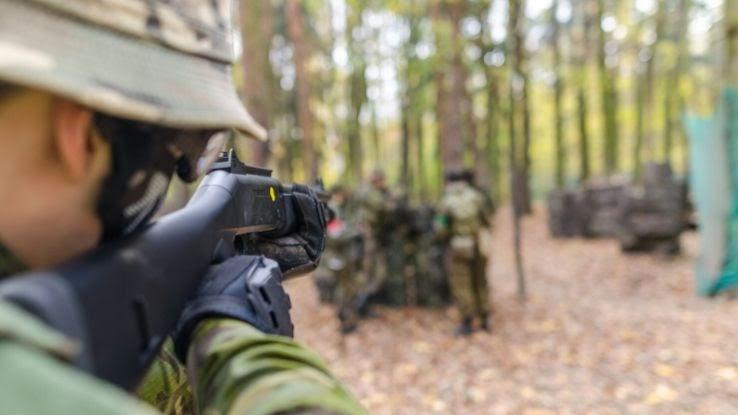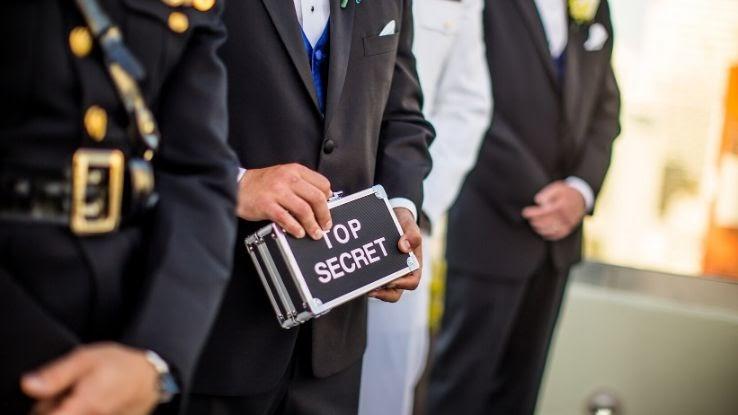Espionage 101: What It’s Really Like to Be a Spy

Do you have what it takes to be a modern day spy? Can you handle keeping your job top secret and going on life-threatening missions? We’ve gathered some of the confessions of former and current spies who work for some of the most popular spy organizations in the world.
Find out exactly what the recruitment process looks like, how spies cope with losing their secret identities after they retire and all sorts of other crazy facts. Here’s your top-secret intel!
Infiltrating Terrorist Networks
One of the most dangerous parts of being a spy is undoubtedly going undercover in some of the most high-profile organizations to find out their plans and top-secret information. An MI6 spy revealed that getting inside those networks involves plenty of research, strategizing and relationship building.

These are just some of the questions they ask themselves: “Could we work alongside them? Are they accessible? Would they have access to information that would be useful to the government? Do we think they might be motivated to work with SIS (MI6) as a covert source?”
Getting a Job as a Spy
Many people seem to think that being recruited as a spy is reserved for those already working in a similar environment. The truth is that sometimes you might get lucky and find a job ad on the official organization’s website. A former MI6 spy revealed that was exactly how he was recruited.

Of course, most won’t flat out say that they’re looking for a spy, but you can usually tell what the job is from the job description. The assessment might be rigorous, but if you’re passionate about the work, you could be right for the job.
Blend in at All Costs
Anonymity is an important factor to consider when you’re a spy. You have to be aware of every move you make and everything you do in order to make sure you don’t arouse suspicion. Blending in is what makes those around you trust you. Failing to do that could be fatal for you and many others.

A former spy discussed the power anonymity has in the profession: “You’ve got to blend in. You have to be ‘Mr. Grey’— a nobody, a person you might pass on the street but you’d forget in a second.”
No License to Kill
So, let’s debunk the most common movie-based myth. Many seem to believe that a license to kill is something all spies possess. Like it’s okay to kill someone without any consequences or questions asked. Nope, it’s really not that easy. Sorry, James Bond.

Spies working at London’s MI6 revealed that James Bond probably wouldn’t be able to handle all the paperwork that results from someone’s death. Everything has to be properly cleared and authorized. So, instead of a license to kill, you pretty much get a license for paperwork if you kill someone. Not as thrilling, is it?
Vetting Process of up to Nine Months
Spy recruitment is absolutely brutal and intrusive. It can take between six to nine months to get hired. The vetting officers are incredibly skilled at their jobs and require all new recruits to face a three-hour to eight-hour interview. Every part of your life is scrutinized to make sure you’re able to handle the job.

A part of the process also involves a series of personality tests and explaining every single detail of your resume. If your career history shows any inconsistency, you need to have an explanation for it, backed up with plenty of proof.
No Prior Drug History
One of the biggest reasons people get rejected for their dream spy career is any kind of prior drug use. Drug testing is a huge part of the vetting process, and it involves submitting a hair sample.

Of course, if you used drugs many years ago and don’t have a criminal record, you might be able to get away with it, but an applicant needs to show a clean record and absolutely no drugs in their system for the period covered by the test. After all, the job is incredibly serious and needs to be handled without any substances interfering with good judgment.
Excellent Secret Keeping Required
This one seems pretty obvious, right? But did you know that spies can’t really talk about their job to anyone outside of their closest circle? Some choose to be very picky about who knows their information. One spy admitted that she didn’t tell her husband about her work until six months into the relationship.

She also added: “I chose not to tell my sibling for quite a long time because I didn’t want to burden them with the information. I didn’t want them to feel they had to protect me.”
Not All Serious All the Time
Have you ever seen a show like Brooklyn 99? It turns out that the office environment of a modern spy can be very similar and sometimes even just as fun as any other corporate place — when the spies aren’t on a mission, of course.

It was revealed that Government Communications Headquarters actually features a Bake-Off competition among the employees, where everyone competes to create the best possible cake. MI6 backed this up, saying they do similar activities as well. Makes you wonder what their secret Santa gift exchange looks like, doesn’t it?
No Mobile Phones
It’s something you wouldn’t think about, but MI6 employees aren’t actually allowed to carry mobile phones inside the building. Of course, if they have to be reached in case of an emergency, the company provides them with technology so they can be contacted.

One employee stated, “We’re never in a situation where a school couldn’t contact you if a child is poorly. I don’t think I’d be able to come to work if my child was ill, and I couldn’t be contacted.” But it does mean you can’t check your Instagram during downtime. Bummer!
The Appeal of Spy Shows
Relax! Just because spies deal with some serious work, it doesn’t mean they don’t enjoy pop culture. Although the details are often inaccurate, many spies just love to be entertained by spy movies and TV series like Killing Eve.

One spy gave her own review of the show, stating “I think the acting was incredible, but, yeah, there are moments where you just want to, like, smash the TV screen, and you’re just like ‘No, that’s not true!'” Be careful, because the more you know about the work, the more suspicious you are.
No Consent Needed to Record
It’s often said that you need a person’s consent if you want to record them. Is it the same for spies? Not in the U.K., at least. Recording calls doesn’t require permission due to the nation’s one-party consent law. That pretty much covers spies from a legal perspective.

Spies basically have permission to record anything they want if it will help solve their case. Disseminating footage to others may turn into a legal issue, but using it to solve a case doesn’t pose a legal threat. In fact, not recording or filming conversations can have worse consequences if you can’t remember small details afterward.
Hello, Trust Issues
One of the most difficult parts of spy work is having a personal life. Spies have revealed that you can’t really trust anyone, and some even follow elementary school advice and make sure they are always alert when crossing the street.

Many spies develop paranoia and various trust issues, not only when it comes to people, but also technology. Some don’t use certain communication apps due to encryption fears. And then, of course, there’s the question of making sure the people close to you aren’t actually spies from the other side.
Crazy Dangerous Missions
Good spies get the inside scoop on some of the most dangerous organizations the world has ever seen. A spy known as Abu Khaled was able to gain unique insight into operations behind ISIS, from who is really in charge all the way to their exact locations and missions.

He uncovered that ISIS created advanced security devices to watch people and track each other. Working on the inside of ISIS gave him a firsthand look into why so many people stay loyal to the organization, despite all of its atrocities and acts of terror.
Utilizing Your Secret Talents
Khaled was a valued member of ISIS because of his extraordinary linguistic talents. As a spy, he was fluent in many different languages, and the organization used him as an interpreter. His talents enabled them to trust him enough to involve him in almost all aspects of their strategies and missions.

This allowed him to work with important people in the organization. He said: “On the left, I had the French and was translating from Arabic to French; on the right, I had the Americans, translating from Arabic into English.”
Strength to Handle Traumatic Events
As a spy, you get to experience many sweet victories, but not all of them are risk-free, and traumatic events can stay with you forever. An MI6 agent suffering from post-traumatic stress disorder revealed that he was a victim of ISIL, who intended to kidnap the agent and behead him while broadcasting online.

He revealed that the terrorists set up a room “with plastic sheeting on the floor, black flags, video cameras and butchers’ knives. I believe they wanted to try the kidnappee under Sharia law, then behead him online.”
Multiple Identities and Personas
Being a spy is tough work. Not only are you involved in dangerous work situations, you also have to remember your alter ego for each situation. A spy known as Mr. Ross, who was recruited from Israel’s military, reportedly had six different identities over the course of 14 years.

That meant he had to hide a lot of his secret spy life from his family, just so he could gather all the necessary information and get the job done. One of his identities was used for seven years!
Russian Espionage in Britain
Spies have revealed that one of the top places where you can find corrupt Russians at work is actually the United Kingdom. One of the spies followed the lives of high-profile Russians residing in London and came across pro-Putin groups as well as plenty of other Russian-based organizations.

The scariest part is that the exact number of undeclared Russian intelligence officers might never be known, but we do know the number has been increasing since the end of the Cold War. According to the head of MI6, Britain is a prime target for Russian intelligence services.
Spy Memoirs on Hold
Spy memoirs are often kept under wraps for years. For example, Anthony Blunt’s memoir was released 25 years after his death. It was hidden in the British Library until then. Being a part of the Cambridge Five spy ring made him one of the most interesting spies in U.K. history.

His memoir revealed his guilt over being a Soviet spy while he was supposed to be working undercover for the Queen of England to spy on the Soviets. The release of his work means we might eventually get plenty of other former spy confessions. All we need to do is be patient and wait on the stories to be made public.
Constant Fear of the Truth
Anthony Blunt thought he was free from his Russian past. He wanted to return to his normal academic life, and he confessed everything he knew about Russian activities. A decade later, his confessions were revealed in an unexpected book that revealed his espionage activities.

Blunt confessed, “I also believed, naively, that the Security Service would see to it — partly in its own interest — that the story would never become public. I, therefore, went back to my own work not only relieved but confident.” Unfortunately for Blunt, the British people considered him a traitor, and he was stripped of his knighthood.
Becoming a Publicly Hated Figure
The book caused public outrage, and Blunt was despised for betraying the Queen. He admitted he considered taking his own life over the sudden public exposure of information. Although he tried to move on from his former spy life, the revealing of his identity made that impossible.

He was booed and shamed everywhere he went, which caused a lot of stress for him and his long-term lover. The stress had a negative effect on Blunt’s health, and he eventually passed away from a heart attack. His outing as a spy left him with only a handful of close friends.
Brutal Imprisonment for Spies
Although he wasn’t a spy, British academic Matthew Hedges was accused of being one by the UAE and was arrested at Dubai’s airport and imprisoned for several months. During that time, he was force fed a cocktail of drugs that caused him to have intense dreams of ending his life.

Before being sentenced to life for a crime he didn’t commit, Hedges spent more than five months in solitary confinement, which took a significant toll on his mental and physical health. Even though he was eventually released, this episode provided extraordinary insight into the prison sentences of many currently imprisoned secret agents.
Official Spies Currently in Prison
Speaking of spies currently imprisoned, the official list seems to include 10 spies. One of them, David Sheldon Boone, sold secret documents to the Soviet Union. Robert Hanssen spied for Soviet and Russian intelligence services, and Ronald Pelton sold secret documents without physical evidence due to his photographic memory.

While many spies are currently serving life sentences in prison, a few will be released in the upcoming years. That means we might get even more espionage secrets and confessions we’ve never heard before. Again, maybe all we have to do is be patient.
Forever Hidden Spies
Like most things in life, there are good spies, and there are bad spies. Many who have betrayed huge secrets have never been caught. For example, it’s not known who was behind the betrayal of MI6 agent Oleg Gordievsky, who was in the middle of a mission when he was outed as a spy.

As of today, the traitor remains undetected, but intelligence agencies haven’t given up on solving the mystery. In addition to Gordievsky, two other spies were similarly exposed from out of nowhere, and most officials don’t believe it was a coincidence. It’s possible a mole was revealing secrets from the inside.
Plenty of Female Spies
When you think of spies, you probably automatically think of men. The truth is female espionage is in as great demand as male. One of the most famous spies was Mata Hari, who operated during World War I. She was originally only an exotic dancer until she was hired by an army captain to gather military information.

Mata Hari led an interesting spy life and provided Georges Ladoux with German government and military secrets. She was later accused by Ladoux of spying for Germany and executed by a French firing squad. Regardless, she remains one of the most notorious spies in history.
Betraying a Country for Money
FBI agent Earl Pitts was one of those spies that fell to the wrong side, all while working for the good. He was caught selling information to the KGB, and he earned a pretty good amount of money — more than $220,000 — for doing it. After his arrest, he received a 27-year sentence.

The judge sent Pitts off to prison with the following words: “You betrayed your country, you betrayed your government, your fellow workers and all of us, really.” Pitts was released to a residential reentry program in December 2019.
Notorious Lady Double Agent
One of the most famous female double agents, besides Mata Hari, is Marthe Cnockaert. She operated during World War II against Germany and was first a nurse before she was recruited by a spy ring.

After the spy ring was exposed, Cnockaert was asked to become a spy once again for a German boarder in her home — without knowing her true identity. At one point, she invented a secret code and gave it to her boss in order to make sure no one in her village would get in trouble for what they knew.
More About Marthe Cnockaert
When Marthe Cnockaert was a nurse, she gained the trust of everyone around her. Because of her involvement in spy work, she was eventually arrested, but her hospital friends had her back and testified for her honest character. This helped her case, as she worked to betray the enemy while also saving the lives of many people.

Being a spy would mean a death sentence for anyone else, but because of Cnockaert’s character and her Iron Cross award, she only served two years in prison. After her release, she received plenty of accolades for her work. She survived the war and wrote an incredible autobiography about her secret life.
FBI’s Fake Russians
In order to break through Russia’s scene, the FBI recruited several fake Russian agents. Dimitry Droujinsky led a double life as a KGB impersonator. He revealed that he worked for the FBI as well as the CIA and even the military due to his Russian-speaking abilities.

He was one of the most talented fake Russian agents the organization had and ultimately uncovered plenty of secrets and information. His main job was to reveal the information the suspects had passed to Moscow. This was extremely important, as foreign intelligence agencies could gain access to many valuable pieces of technology.
Unrealistic High-Speed Car Chases
You know how movies always show a high-speed car (or two or three) in spy-themed movies? Well, it’s not really a thing in the lives of actual spies. This type of thing would only happen on a mission if the situation went really bad really quickly and you needed to escape.

If you’re driving fast, you’re usually not chasing someone — you’re probably escaping from something. Spies insist that most of them are good enough to avoid this type of situation. So, the truth is spies in the movies might have some unrealistic talents. What?
Movie Technology Behind the Times
Spies have admitted that movie technology sometimes doesn’t accurately represent what is available in actual organizations. This is mainly due to confidentiality and trade secrets that can only be revealed to select individuals. So, when you see James Bond use a really cool gadget, the truth is it probably existed at least a decade before the movie in organizations like the CIA.

High-tech gadgets are often classified to ensure the public doesn’t really know it’s something that’s actually available in real life. After all, we can’t have everyone running around with spy tech, right?





